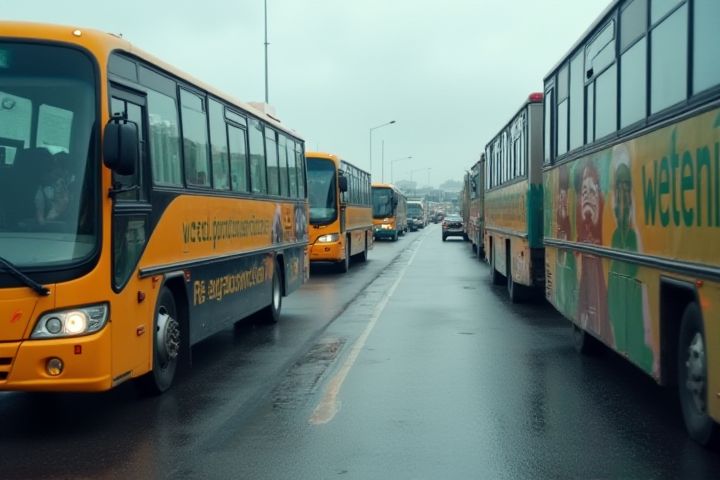
Nigeria's transportation system encompasses various modes, including road, rail, air, and waterways, playing a crucial role in the nation's economy and connectivity. The road network, comprising over 200,000 kilometers, facilitates the movement of goods and passengers across urban and rural areas, but often suffers from poor maintenance and congestion. The rail infrastructure, revitalized in recent years, boasts lines such as the Lagos-Ibadan and Abuja-Kaduna routes, enhancing intercity travel and cargo transport. Nigeria's aviation sector features several international and domestic airports, making air travel a popular choice for long-distance journeys, with airlines like Arik Air and Air Peace leading the market. Inland waterways, particularly the Niger and Benue rivers, offer an alternative mode of transport, although they remain underutilized compared to other systems.
Road network
Nigeria's transportation system heavily relies on its extensive road network, which spans over 200,000 kilometers and facilitates the movement of goods and people across vast distances. The roadways connect major cities such as Lagos, Abuja, and Port Harcourt, playing a crucial role in economic activities and trade. Despite the significance of this infrastructure, many roads face challenges such as poor maintenance and congestion, impacting travel efficiency. Investing in road infrastructure improvements is essential for enhancing connectivity and supporting Nigeria's growing population and evolving economy.
Public buses
Nigeria's transportation system heavily relies on public buses, which are vital for urban mobility and connecting remote areas to city centers. These buses, operated by private companies and government entities, provide affordable travel options for millions of passengers daily. In cities like Lagos and Abuja, the Bus Rapid Transit (BRT) system enhances efficiency and reduces congestion, while also promoting safety for commuters. By utilizing scheduled routes and dedicated lanes, public buses in Nigeria aim to improve accessibility and reduce travel time, making them an essential component of the nation's infrastructure.
Rail services
Nigeria's transportation system emphasizes the development and expansion of rail services as a means to alleviate road congestion and enhance economic growth. The railway network, managed predominantly by the Nigerian Railway Corporation, has seen significant investments in modern infrastructure, including electrification and upgrades to rolling stock. Key routes connect major cities such as Lagos, Abuja, and Port Harcourt, facilitating the efficient movement of goods and passengers across the country. You can explore opportunities for freight transport, as the rail system offers a reliable alternative for logistics, reducing travel time and costs significantly.
Air travel
Nigeria's air travel sector has experienced significant growth, with major airports including Murtala Muhammed International Airport in Lagos and Nnamdi Azikiwe International Airport in Abuja serving as key hubs. The national carrier, Arik Air, along with numerous private airlines, provides both domestic and international flights, enhancing connectivity. Modernization efforts, such as the upgrade of airport facilities and the introduction of new aircraft, improve passenger safety and comfort. Consider exploring flight routes that cater to your travel needs, allowing for efficient navigation across Nigeria's diverse landscape.
Inland waterways
Nigeria's transportation system heavily prioritizes inland waterways, leveraging its extensive network of rivers and lakes for efficient cargo movement and passenger travel. Major routes include the Niger and Benue Rivers, which facilitate trade between regions, promoting economic growth and reducing road congestion. Investing in port facilities and dredging projects enhances navigability, allowing larger vessels to transport goods across the country. By utilizing these waterways, you contribute to a more sustainable transportation model, minimizing environmental impact while enhancing connectivity.
Motorcycle taxis
In Nigeria, the transportation system heavily relies on motorcycle taxis, commonly known as 'Okadas', due to their ability to navigate congested urban areas efficiently. These motorcycles provide a cost-effective means of travel, catering to millions of commuters in densely populated cities such as Lagos and Kano. With a growing number of ride-hailing apps, the motorcycle taxi industry is experiencing rapid digital transformation, offering convenience and accessibility to users. However, safety concerns and regulatory challenges persist, prompting ongoing discussions about improving safety standards and managing traffic regulations in this vibrant transport sector.
Traffic congestion
Traffic congestion in Nigeria significantly impacts urban mobility, leading to increased travel times and economic inefficiencies. Major cities like Lagos and Abuja grapple with inadequate road infrastructure and a high volume of vehicles, exacerbating the challenges associated with transportation. The rising population density contributes to overcrowding on public transportation, highlighting the need for improved systems including rail and bus rapid transit. Addressing these issues requires comprehensive urban planning and investment in smart transportation solutions to enhance efficiency and accessibility for commuters.
Ride-hailing apps
The transportation system in Nigeria has significantly evolved with the rise of ride-hailing apps like Uber, Bolt, and Lyft, transforming urban mobility. These platforms provide convenient and cost-effective alternatives to traditional taxis, allowing users to book rides via smartphones with real-time tracking features. Ride-hailing services have also addressed safety concerns by implementing driver verification processes and user rating systems. As a result, this innovation enhances accessibility and fosters economic opportunities for drivers and local entrepreneurs.
Fuel availability
Fuel availability is a critical factor in Nigeria's transportation system, influencing both logistics and mobility. The country's extensive network of roads, railways, and waterways heavily relies on petroleum products, mainly petrol and diesel, to power vehicles and transport goods. Inconsistent fuel supply often leads to increased costs and inefficiencies, affecting public and private sector operations. Ensuring a stable fuel supply chain is essential for enhancing economic activities and improving the overall effectiveness of Nigeria's diverse transportation methods.
Road safety issues
The transportation system in Nigeria is critical for economic growth yet grapples with significant road safety challenges. High rates of traffic accidents and fatalities are often attributed to poor road conditions, inadequate signage, and a lack of enforcement of traffic regulations. Initiatives aimed at improving road safety include public awareness campaigns and stricter penalties for traffic violations, which aim to enhance compliance among drivers. Improving infrastructure, alongside investing in driver education programs, is essential for reducing accidents and ensuring safer travel for all road users in Nigeria.
